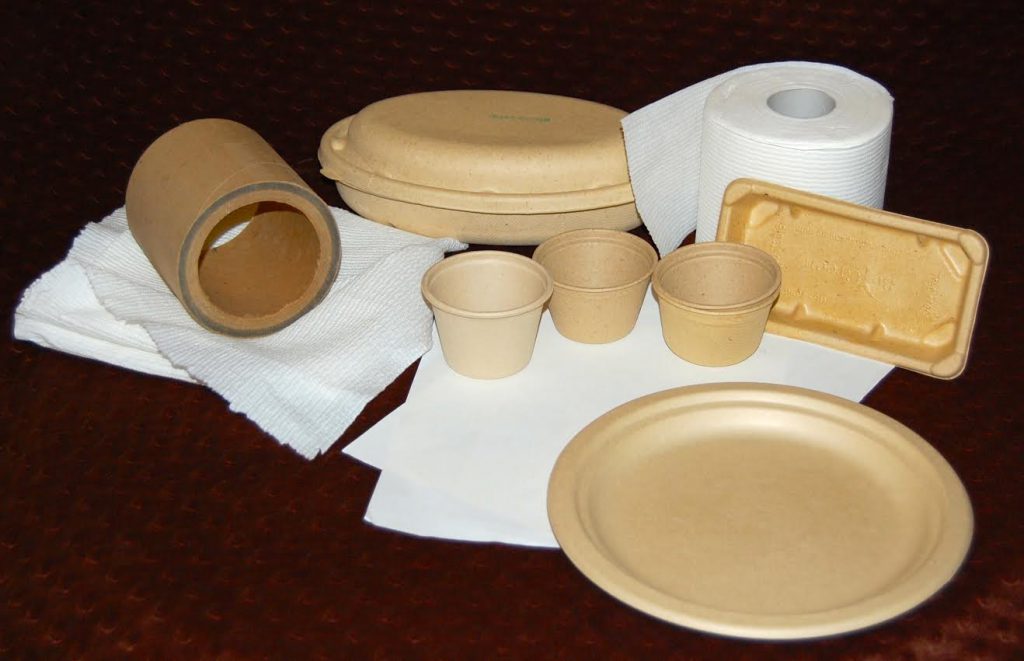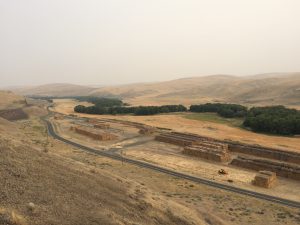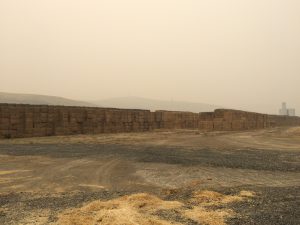Consider if you will, the humble straw. Not the plastic tubes currently under fire for being ecologically unsound, but the yellow stuff you spread to protect your freshly seeded lawn. So how could it possibly be connected to that Happy Meal your kids clamor for?
Read on, dear reader, read on.
The Second Little Pig built his house out of Straw
First, let’s define what exactly straw is for the agriculturally challenged: straw is the dried stalks of grain plants. It is basically the waste left over after the grain has been harvested. Straw is traditionally used for things like landscape mulch and horse bedding.
Don’t confuse straw with hay. Hay is made from grass, clover and such, not grain crops like oats and wheat. Since hay includes the plant’s seed heads, hay is good feed for livestock; it’s what a cow eats in the pasture without all the walking. Conversely, straw consists of mostly fiber and offers little nutritional value. Both straw and hay are transported in bales, but they have completely different uses.
So let’s look at Mr. Average Farmer in Eastern Washington. Every year he harvests many tons of grain, leaving behind about 80% of that weight in straw. That’s a lot of waste! So what does he do with it? As I’ve mentioned in past posts, there isn’t a lot of ranching going on in this part of the country, so demand for animal bedding is low. The same for landscaping mulch in a country too dry support lawns without constant watering. So with few buyers and low prices in the local market, Mr. Farmer’s spreadsheet tells him it will cost more to bale the straw than he can get selling it. So what does he do?
He burns it.
Yep. Thousands of acres of burning fields smoking up the skies and adding to the air quality problems the west coast already suffers. Even with the government making farmers pay for a burn permit for every acre, the numbers make it cheaper to burn than bale for many. There has to be a better way, right?
A New Idea from those smart aleck College kids
Enter Columbia Pulp (CP) a company that thinks they have a solution. It’s kind of a neat outfit, and potentially a big deal, but unlike Tesla, you’ve probably never heard of the company. Columbia Pulp is managed by of a bunch of folks from the pulp and paper industry. To our friend Mr. Average Farmer, that field of straw is a liability, but CP sees a steady supply of raw material that can be bought cheap. Starting with the premise that one plant fiber is as good as another, scientists at the University of Washington figured out how to make paper pulp from all this unwanted straw. CP is committed to taking the project out of the lab and into production of straw pulp that can be used to make packaging just like wood pulp, except that no trees are cut, no sulfur is used (that’s what makes wood pulp mills stink), and less water is required.
The company projects that their pulp will be cheaper to produce than traditional wood pulp. So you have a competitive end product, lower environmental impact and a new market for farmers: win, Win and WIN.
CP is operating a small training and demonstration mill now in Pomeroy while they complete building their main plant at Lyons Ferry. Both facilities are strategically located close to the wheat farmers to minimize transportation cost. A bunch of the construction guys building the plant were staying at the same RV park as me just up the road. The local farmers say the CP is planning to process 500 tons of straw a day when the facility starts running. And they are confident: Columbia is already stockpiling straw in gigantic storage yards.
Cheaper, more environmentally friend paperboard means a better happy meal for your kids and a better planet for us all. This is how we’re supposed to behave as human beings – devising technology to come up with new solutions to old problems. I like what they’re doing at Columbia Pulp. It makes be proud to be an Earthling.



The line on the map showing your route has disappeared.
Thanks, Pop. It should show now as a pink line.
It’s complicated, but the short answer is Google broke it and I fixed it, but they might break it again. Strangely, multinational corporations no longer ask me before they change stuff since I retired from the biz.